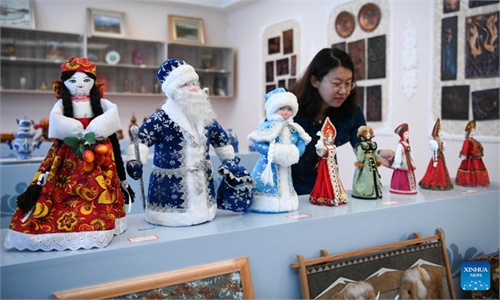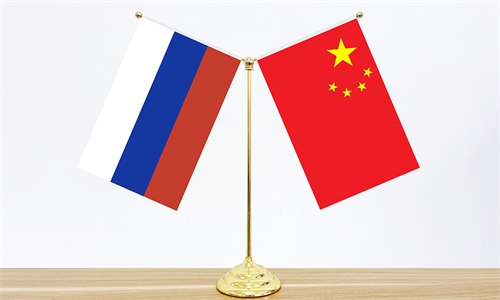SOURCE / PRESS RELEASE
Chinese firms welcome in the Russian market: Sberbank’s Anatoly Popov

Anatoly Popov, deputy chairman of the executive board of Sberbank Photo: Courtesy of Sberbank
China has been Russia's largest trading partner for 13 consecutive years, and economic and trade cooperation requires the support of banking institutions. Sberbank, the largest bank in Russia, is actively involved in the process, according to Anatoly Popov, deputy chairman of the bank's executive board.
Q: How do you estimate the foreign trade turnover of Russia and China and what is the share of yuan payments?
A: The trade turnover between Russia and China sets new records year after year, and China is becoming Russia's key foreign trade partner. Last year it amounted to $190 billion, and in the first half of this year, the volume of bilateral trade already amounted to $115 billion. By the end of this year we expect record levels of trade turnover between our countries.
Nowadays, the yuan has already taken second place after the ruble in foreign trade payments. Its share in Russian exports increased to 25 percent, and to 34 percent in imports. The loan portfolio in yuan has grown almost 1,000 times since the beginning of 2022, deposits have grown 130 times, and conversion transactions on the yuan/ruble pair are close to an impressive figure of 1 trillion rubles ($10.28 billion) since the beginning of the year.

Sberbank's headquarters in Moscow Photo: Courtesy of Sberbank
Q: Tell us about the structure of exports and imports. What categories of goods are in the top three for bilateral trade?A: Exports from the Russian Federation to China are extremely concentrated. Slightly less than 75 percent of its volume is accounted for by hydrocarbons and their processed products: oil, gas of all types, coal and petroleum products. The top three export products include metals, as well as food products and agricultural raw materials.
Imports of goods from China to Russia are also concentrated. The volume of the 10 most popular product categories in the import balance exceeds 80 percent. By product groups, most of all we import machinery and equipment, chemical products and textiles.
Q: How does Sber contribute to the strengthening of Russia's export potential in trade with China?
A: Sber supports Russian exporters in establishing relations with China as part of business missions that we hold online to help entrepreneurs find foreign counterparties in friendly countries.
From January to August 2023, Sber conducted eight online business missions, in which more than 1,000 Russian entrepreneurs took part. Export business missions with China are in particular demand among our clients. In the near future we are preparing similar events for producers of coal and confectionery products.
Q: What are the investments in fixed capital of the Russian economy in the third quarter of 2023? What is the Chinese investors' contribution?
A: According to our estimates, the total portfolio of new projects planned in Russia with Chinese capital is at least 2 trillion rubles and, of course, this is not the limit.
Sberbank welcomes the entry of Chinese companies into the Russian market, especially if accompanied by the localization of business or production in Russia. Localization is also an opportunity for Chinese companies to occupy a qualitatively new niche in their segment of the local market.

Sberbank office combines modern technologies and convenience of workplaces for employees. Photo: Courtesy of Sberbank
A: This number includes a wide list of companies with an authorized capital from 10,000 rubles to hundreds of millions, with one common attribute - the presence of at least one shareholder from China. Moreover, almost 90 percent of these companies belong to the segment of micro and small enterprises. Speaking about industries, it correlates with those fields where Chinese companies are competitive both in the home market and in Russia: These are motor vehicles, telecommunications equipment and consumer electronics, wholesale trade, logistics, construction services and agro-industrial complex.
In order to build partnerships, we offer both classic banking products - working capital and project financing, bank guarantees, documentary transactions, opening accounts for non-resident companies - as well as non-financial services of Sber's subsidiaries. For example, SberResheniya and Strategy Partners, which provide consulting services for registering a business in Russia, help clients to get comfortable in the Russian market and determine the most appropriate development strategy.
For companies that are just thinking about establishing cooperation with the Russian Federation, industry business missions are organized in order to find potential partners with minimal effort and learn about the peculiarities of doing business in our country. In addition, over the past two years, Sber has held a number of events aimed at supporting our Chinese partners. In 2022, Sber organized the international seminar "Deep Dive China" immerging Russian companies in the processes of doing business with China. And in 2023, the Day of China was held for Chinese businessmen to conduct business in our country.
Q: In which sectors of the Russian economy is Sber recording the greatest increase of companies from China?
A: Chinese businesses already have strong positions in areas such as commercial and passenger vehicles, telecommunications equipment and consumer electronics. Chinese companies are also involved in important industrial and infrastructure projects. In addition, China is a leader in the development and application of the latest digital technologies in business, which is also an interesting area for the development of Russian-Chinese cooperation.
Q: How does Sber contribute to the development of Russian-Chinese partnership in the automotive industry?
A: Both the bank itself and our subsidiaries work closely with leading Russian and Chinese automakers. Sber is ready to provide such companies with a comprehensive solution: working capital and project financing, accounts receivable management tools, structuring international payment routes, financing of end customers. Analytics based on big data, a technology platform for car purchasing, telematics and other solutions make a valuable contribution. Thus, Sber Group is actually a strategic partner of the Russian automotive industry.

Rapid development requires space renewal. Photo: Courtesy of Sberbank
A: First of all, this is due to the fact that the Russian Government is taking many steps to create favorable conditions for Chinese business when investing in the Far East. In addition, for Chinese businesses, the Far East is an attractive development area and a comfortable point of entry into the foreign market. Chinese enterprises are widely involved in container shipping between China and the Far East. Chinese construction companies are helping to develop urban infrastructure in the region.
Logistics hubs are being developed in regions bordering China - warehouse and transport infrastructure is being built. Sber is ready to become a financial partner for companies that use hubs on the way to new cross-border bridges in the Amur and Jewish Autonomous Regions, land and sea border crossings in the Khabarovsk and Primorsky Regions. This step is necessary to strengthen the export potential of the Far East.
We opened an office of Sberbank, which serves Chinese citizens. It is located in the city of Blagoveshchensk, 800 meters from the Chinese city of Heihe across the Amur River (known as the Heilongjiang River in China). Customer service is provided in Chinese using special devices. Employees are studying Chinese hard in order to overcome linguistic barrier and cultural differences in meetings with Chinese businesspeople.
Q: Is Sber studying China's experience in the issue of asset tokenization and what is the bank's position regarding the rights of digital assets?
A: China has vast experience in tokenizing property assets. The Chinese government is actively introducing distributed ledger technology into government agencies, including for recording rights to real-world assets. Being a secure environment, blockchain can be used in government administration. China has already adopted a state program for blockchain regulation, where courts and other organizations are already using blockchain technologies. We certainly believe that the experience of our partners is useful and can be applied to us.
Sber follows global trends and supports the expansion of "digital rights" and "asset tokenization" concepts, and also recognizes the importance of smart contracts. Promising directions for the digitalization of property assets, in our opinion, can be digital companies by recognizing limited liability companies as digital companies, movable and immovable property.
Q: What practices can Russia borrow from China in developing domestic tourism?
A: We are very similar to China in several aspects. China, the same as Russia, has significant tourism potential. The cultural and historical resources of both countries include monuments, museums and temples. Tourists are also attracted by the local cuisine and picturesque nature. Like Russia, China has a fast-developing domestic tourism market - tourism is becoming the predominant industry and driver of the economies of the two countries.
In terms of application, we would be interested in studying three practices in the development of domestic tourism. First, this is a government policy, which contributed to the further development and modernization of tourism infrastructure in China, including through the construction of new national resorts and attractions. Second, the popularization of domestic tourism as a healthy lifestyle. As a result of this work, ordinary residents began to use tourism services in China, creating domestic demand for the hospitality industry services within the country. And third, the complexity of the Chinese development principle "five in one" is interesting. It reflects the theory of harmonious coexistence of man and nature and includes five interrelated elements: ecological environment, green development, social harmony, system perfection and cultural heritage.
A clear indication of the achievements in the development of China's tourism industry is that its total contribution to China's GDP is more than 10 percent. In Russia this figure is at 2.6 percent and we see an opportunity to at least double it.



